It’s not an everyday occurrence to meet people who live their lives with empathy and respect for all living creatures. It is good fortune and heart-warming to meet them, and the experience can instill hope and the desire to reach out to those less fortunate, human or critter.
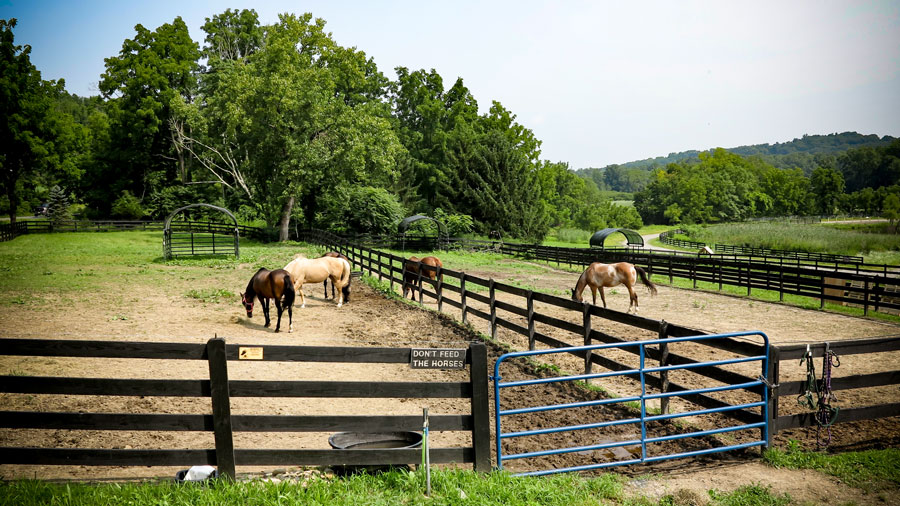
Joan Schneiber and Bob Thompson adopted all their dogs and cats. “We look for animals that need homes,” says Joan. “I had horses all my life. I always took everybody’s old horses and kept them till they died, well into their thirties. We keep our horses forever.” Since her recent retirement from Mars Chocolate North America, Joan was anxious to get back into riding again. She didn’t care what breed – she just wanted a nice, quiet horse to putter around on.
She found what she was looking for at Helping Hearts Equine Rescue in Monmouth County. Joanie and Bob went through a month-long interview process that included talks with two references, her veterinarian, trainer and farrier and photos of the farm to prove they could properly care for him. The horse was Buddy, a three-year-old unbroken rescue eighty miles away, yet born just a mile from her home in Belvidere. “He is the best horse I’ve ever had,” she says. She also always wanted a mule and, a year and a half ago, adopted one from a private owner who got him from an equine rescue, who rescued him from a kill pen at auction in New Holland, PA. She adopted him as company for her donkey who had been killing her sheep by playing too rough. The mule, named Ferris Muler, complete with Instagram page, is now four years old, and he and Maxwell the donkey are having a kickin’ good time apart from the sheep. Charlie the potbellied pig, another adoptee, also shares the good life.
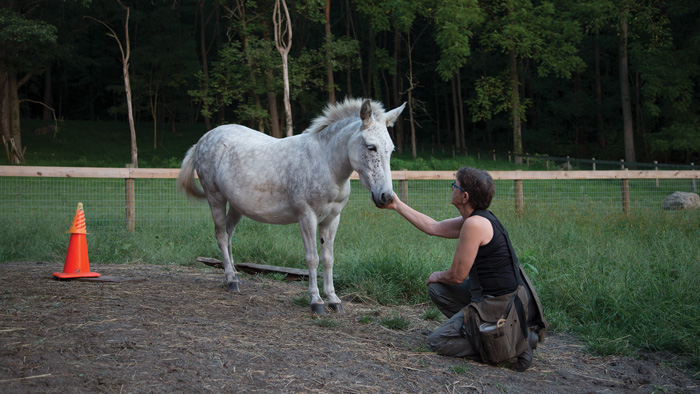
Joan is unsure if she’ll ever adopt another equine, especially a donkey or mule who live well into their forties. “I have to consider my age, what I’m doing and what would happen to them when I’m gone.” The couple are trying to resolve that issue now. “You have to know what your limits are. It’s a hard decision.”
Susankelly and Bruce Thompson opened Mylestone Equine Rescue in Phillipsburg in 1994, almost twenty-four years ago. Last month, two starved horses arrived, making their current total thirty horses and ponies. They came from a large profile case in which someone got in over their head and was unable to provide even basic care for the horses. At Mylestone, loving care is paramount, bolstered by financial checks and balances. There is a symphony of reasons why Mylestone has survived almost a quarter century while providing excellent care for their animals: dedicated volunteers, part-time help, generous donors, faithful sponsors, foundation grants and eternal fundraising. “I knew that some of the horses would be difficult to place because they’re not rideable,” says Susankelly, who started a dedicated Sponsorship Program for these special needs Sanctuary horses.
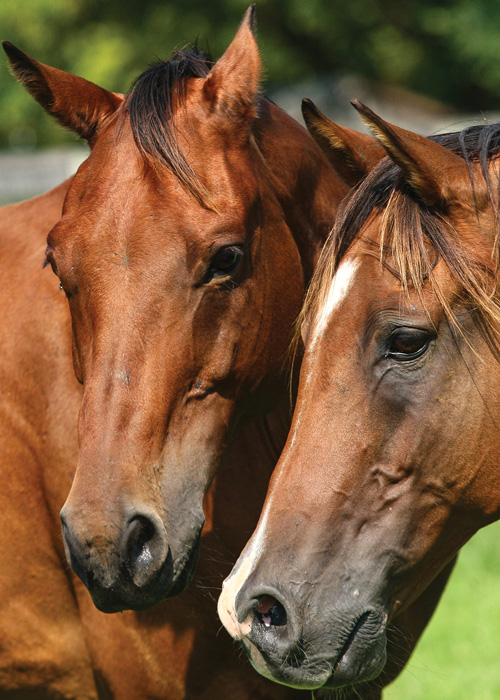
Some volunteers come through a grooming program with Phillipsburg High School, one of many schools that Mylestone has worked with over the years. Students come, groom the horses and lead them around once a week in good weather. Mostly special needs kids take care of the Sanctuary horses, which remain at Mylestone for life. Teachers feel that the kids benefit from their handling and connection with the horses. In turn, “the horses give unconditional love,” says Susankelly. “These horses have been abused and come from different backgrounds, and the kids can relate.” The kids learn about the horses’ backgrounds. They pet and lead them, but never ride them. Bruce develops small goal-oriented projects with the kids that create a feeling of accomplishment such as the jungle gym they made for the farm’s goats and mini-horses. “The kids had never used tools before. It was exciting for them to see that they built something.”
Fundraising is a constant in the rescue’s operations. “We have a wonderful Board of Directors. I couldn’t do it without Lois, Cheryl and Dr. MaryBeth Hamorski.” The 501c3 nonprofit goes through an independent audit every year, the transparency needed to qualify for grant money. It’s important that there are checks and balances, Susankelly feels.
Mylestone is a labor of love for the whole Thompson family including their sons, Samuel and Austin. “We live very frugally in order to do this. We try to help as many horses as we can. Most horses we have now, we’ve had for many years because they’re not rideable. Most people don’t want to adopt a horse they can’t ride so we end up caring for her. I have one mare here for twenty-three years. I rescued her when she was three or four.”
The farm at Mylestone Equine Rescue is twenty-two acres with pastures, a large barn, a lot of little sheds and a lot of special needs horses. They feed four times a day; for starvation cases it’s more often. You can sponsor a horse for $25 a month and receive a photo and a letter of current happenings on the farm.
At Blue Arrow Farm in Pine Island, New York, just across the Sussex County border, two horses rescued from harrowing lives bask in sunny paddocks. The farm’s eighty-five acres contain pasture and paddocks with shelters, an exercise track around a pond, barn, gardens and a hops farm.
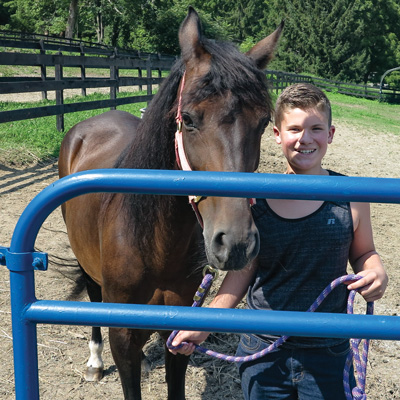
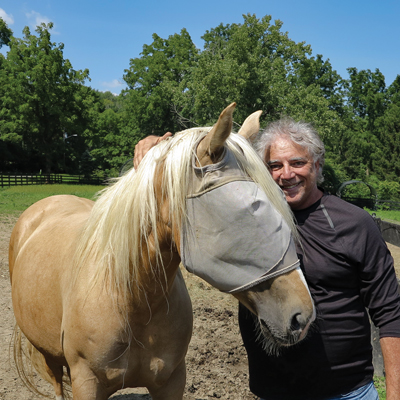
Cherokee, a nine-year old Palomino adopted a year ago, had health issues, was more than two hundred pounds underweight and had bad stall manners. You couldn’t touch her feet because she had been shackled before coming to Blue Arrow. The resident instructor is training her, and soon she’ll be ready to ride. Angel, a seven-year old Paso Fino that arrived three months ago, has already found fourteen-year old Logan Slate, who was looking for a horse to take care of. Logan comes to Blue Arrow every day to take Angel in and out of the barn, feeds and grooms her, picks her feet, and makes sure she gets proper vet and farrier care. Logan’s family are looking for an additional horse to adopt.
At this point Blue Arrow’s owner, Don Oriolo, has six dogs and four adopted horses at home besides the two at the farm. He takes in animals that need a home like the pound dog who was caged on death row. “He bit everybody. I lassoed him with a leash and took him outside. From the second I took him home, he wouldn’t leave my side. Animals sense the love. There’s nothing like hands-on brushing and touching the animals.”
Oriolo started when he rescued two hundred cats left in an abandoned house. Working with a veterinarian and Emma “the super trapper” from St. Hubert’s Animal Welfare Center in Madison, he made a deal. He raised money and got cat food donations, and St. Hubert’s “vetted them up.” “What I’m proud of with the cats is St. Hubert’s. Because of the notoriety, in Trenton they appropriated and made funds available to fight animal research cruelty. It’s not just horses that I’m interested in – it’s animals.”
Oriolo knows the horses’ needs as well as the limits of his own resources; he takes in only two or three at a time. It’s expensive to rescue a horse, requiring a lot of personal attention by numerous people, including veterinary care. While it took a month to be able to touch Cherokee’s feet, a vet bill might be $1,000 per visit, with Xrays and other procedures. Says Oriolo, “I make sure they’re bullet-proof. I’m not looking for anything from anybody. It’s all on my dime. Good Kharma always leads to other positive things.”